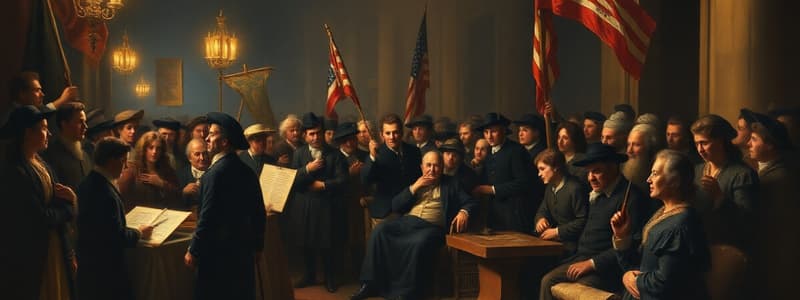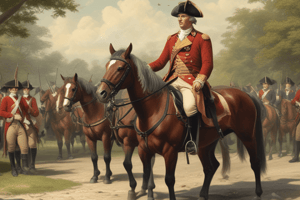Podcast
Questions and Answers
What was the main reason King George III implemented the Stamp Act?
What was the main reason King George III implemented the Stamp Act?
- To assert control over the colonies
- To punish the colonies for resistance
- To create peace in the American colonies
- To raise funds for his empire (correct)
Why did the colonists consider the Stamp Act unfair?
Why did the colonists consider the Stamp Act unfair?
- They had no representation in Parliament (correct)
- They were not British citizens
- They believed it was unconstitutional
- They had not agreed to any taxes
What action did women take in protest of the tax on cloth imported from Britain?
What action did women take in protest of the tax on cloth imported from Britain?
- They wrote letters to the King
- They organized public rallies
- They boycotted all British goods
- They began weaving their own cloth (correct)
What event is known as the Boston Massacre?
What event is known as the Boston Massacre?
What was one of the consequences of the Boston Tea Party?
What was one of the consequences of the Boston Tea Party?
What did colonists refer to the harsh actions taken by King George after the Boston Tea Party?
What did colonists refer to the harsh actions taken by King George after the Boston Tea Party?
Which meeting did colonists call to discuss their concerns about Great Britain in 1774?
Which meeting did colonists call to discuss their concerns about Great Britain in 1774?
What was a significant peak moment prior to the Revolutionary War concerning British troops?
What was a significant peak moment prior to the Revolutionary War concerning British troops?
What were the colonial militias composed of?
What were the colonial militias composed of?
What did colonists aim to achieve by sending a peace proposal to the king?
What did colonists aim to achieve by sending a peace proposal to the king?
Flashcards
Stamp Act
Stamp Act
A tax imposed by the British Parliament on all paper goods sold in the American colonies, requiring a special stamp.
Colonial Protests
Colonial Protests
The colonists' demonstrations against the Stamp Act, arguing that they had no representation in Parliament and were being unfairly taxed.
Boston Massacre
Boston Massacre
A tragic incident in 1770 where British soldiers fired into a crowd of colonists in Boston, killing five people.
Boston Tea Party
Boston Tea Party
Signup and view all the flashcards
Intolerable Acts
Intolerable Acts
Signup and view all the flashcards
First Continental Congress
First Continental Congress
Signup and view all the flashcards
Patriots
Patriots
Signup and view all the flashcards
Loyalists
Loyalists
Signup and view all the flashcards
Colonial Militias
Colonial Militias
Signup and view all the flashcards
Lexington and Concord
Lexington and Concord
Signup and view all the flashcards
Study Notes
Taxes and Protests
- In 1765, King George III needed money for his empire, so Parliament imposed the Stamp Act.
- The Stamp Act required a special stamp on every piece of paper sold in the American colonies.
- Colonists opposed the Stamp Act as they believed Parliament couldn't tax them without representation.
- Colonists protested, and the Stamp Act was eventually repealed.
- Women protested taxes on imported cloth by weaving their own cloth at home.
Boston Tea Party
- In 1770, British soldiers fired on a Boston crowd, resulting in the Boston Massacre.
- In 1773, most taxes were repealed except the tax on tea.
- Colonists dressed in disguise and dumped tea from British ships into Boston Harbor during the Boston Tea Party to protest the tax on tea.
Revolution Begins
- King George punished the colonies by closing Boston's port and banning town meetings, which were called the Intolerable Acts.
- Colonists were divided: Patriots wanted independence, Loyalists wanted peace with the king and many colonists remained undecided.
- The First Continental Congress met in 1774 in Philadelphia to discuss a peace proposal to the king.
- In April 1775, there were rumours that the British were marching to seize colonial weapons.
- The colonial militias (groups of volunteers) fought against British troops at Lexington and Concord.
Studying That Suits You
Use AI to generate personalized quizzes and flashcards to suit your learning preferences.
Description
Explore the key events leading to the American Revolution, including the Stamp Act, Boston Tea Party, and the Intolerable Acts. This quiz will test your understanding of how colonists protested against British taxation and their quest for independence. Dive into the political tensions that shaped early American history.




